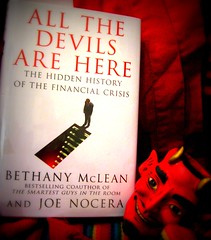Question by DAR: Did the GrammLeache bill in 1999 really ‘deregulate’ banks? Is that why Ron Paul voted against it? Loves regs?
http://reason.com/blog/show/129593.html\
That followed bailing out hedge funds, if you recall. Ron Paul, rather than seeing it as deregulating saw it as a set up for further bailouts and taxpayer liability for failing entities. He thought the deregulation parts could be written in a one page bill and the rest was new REGULATION which would end up creating bubbles and shifting liability for business ventures to taxpayers.
Sound familiar?
And if he was so prescient then, why is the government now only turning for solutions to those who drove us off a cliff, to begin with?
From 1999:
“today we are considering a bill aimed at modernizing the financial services industry through deregulation. It is a worthy goal which I support. However, this bill falls short of that goal. The negative aspects of this bill outweigh the benefits….
The growth in money and credit has outpaced both savings and economic growth. These inflationary pressures have been concentrated in asset prices, not consumer price inflation–keeping monetary policy too easy. This increase in asset prices has fueled domestic borrowing and spending.
Government policy and the increase in securitization are largely responsible for this bubble. In addition to loose monetary policies by the Federal Reserve, government-sponsored enterprises Fannie Mae and Freddie Mac have contributed to the problem. The fourfold increases in their balance sheets from 1997 to 1998 boosted new home borrowings to more than $ 1.5 trillion in 1998, two-thirds of which were refinances which put an extra $ 15,000 in the pockets of consumers on average–and reduce risk for individual institutions while increasing risk for the system as a whole.
The rapidity and severity of changes in economic conditions can affect prospects for individual institutions more greatly than that of the overall economy. The Long Term Capital Management hedge fund is a prime example. New companies start and others fail every day. What is troubling with the hedge fund bailout was the governmental response and the increase in moral hazard.
This increased indication of the government’s eagerness to bail out highly-leveraged, risky and largely unregulated financial institutions bodes ill for the post S. 900 future as far as limiting taxpayer liability is concerned. LTCM isn’t even registered in the United States but the Cayman Islands!
…My main reasons for voting against this bill are the expansion of the taxpayer liability and the introduction of even more regulations. The entire multi-hundred page S. 900 that reregulates rather than deregulates the financial sector could be replaced with a simple one-page bill.
Should they be listening to Ron Paul – who is telling them to let the market handle this mess rather than extending the pain with bailouts?
Best answer:
Answer by Greg
It merely dissolved the “firewall” between investment banks and consumer banks. After the Great Depression, the FDR Administration in effect said to the investment banks, “If you want to gamble, fine, but you aren’t going to do it with peoples’ life savings”, so they prohibited consumer banks from investing in stocks and other such instruments.
What it did not do is deregulate OTC commodities (default swaps are a huge problem right now). That was done in the 1999 Commodities Modernization Act (again introduced by Phil Gramm), and what it did not do is place capital reserve requirements on investment banks (and the root of the problem was just how highly leveraged these firms were).
As for the setup for future bailouts, that’s baked in to the mergers that are underway. We saw from the Lehman bankruptcy (Lehman was leveraged at about 50-1) that the fallout was severe, so the Fed and the Treasury were forced to act to keep the investment banks from folding, but amid all of this there is further consolidation through mergers and acquisitions of both consumer and investment banks, so if they were too big to fail before, well the ones that are left are bigger.
Know better? Leave your own answer in the comments!






